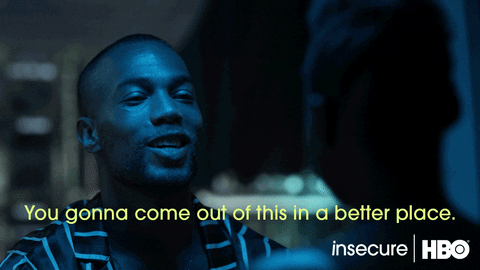Google 'imposter syndrome' and a range of psychology research will populate. But to keep it simple, it is the experience of feeling like a phony. At any moment, you believe you will be found out, like a fraud. You feel like you don’t belong or you achieved such success through luck, not because you are talented.
This isn’t a new feeling for Issa. She began living in a “less-than” state once complications began while planning and organizing this block party. If you think about it for a moment, her feelings are valid.
Issa came up with the idea on a whim, at Coachella. Soon afterward, she quit her job. She falls hard into a friendship with her ex’s new girl. Her headliner drops out. Molly won’t lend out her connect to help.
Issa’s desire for everything to be perfect is real. We have all been here before. Some of us are living in that moment right now. That period in your life where your hard work is prevalent, but it’s still not enough for you. Where other people have given you praises, but you still are seeking validation.

Dr. Valerie Young wrote a book entitled, The Secret Thoughts of Successful Women: Why Capable People Suffer from the Impostor Syndrome and How to Thrive in Spite of It, and in this book she describes 5 types of imposter syndrome.
- The Perfectionist
- The Superhero
- The Expert
- The Natural Genius
- The Soloist
Issa experienced living in all five areas. I'm sure you have too. Let’s check out how to overcome each of these.
The Perfectionist
Life is not meant to be perfect. Nothing is meant to be perfect, but we insist on making sure our day to day is as perfect as it can be. This gets exhausting and daunting.
A perfectionist usually sets exceptionally high goals for themselves, never satisfied with their work, and unsure of how to handle failure.
Is this you? If so here’s how to check this syndrome at the door:
Set realistic goals. Don’t go overboard trying to impress your new boss or colleague. Your goals should be aspirational, but also attainable. This week, try and shorten your daily to-do list. Instead of trying to accomplish 5 things in one workday, only select 2 or 3 today. Focus on how you can deliver the best results in those areas.
The Superhero
Are you the one that stays late at work all the time? Volunteering yourself for yet another assignment, knowing damn well you haven’t finished the first two projects? If so, you fall into the superhero category.
How to check this syndrome:
Learn to say no. Saying no at work is probably one of the hardest things to do. You want to show others that you can do the job and that you have an incredible work ethic. Being the yes person at work does not make you the most valuable player. It eventually will wear you down to be the least productive teammate.
Today, look at your project load. What can you eliminate or delegate to someone else? Give yourself free space for more creative energy to enter your body. When you are trying to tackle everything, you block new things from entering in.

The Expert
Experts are labeled as super learners or students. It’s the person that always wants to take a course or read a book on how to become better at something. You will never be 100% great at something. You can be super close, but in the times where technology changes so quickly, you can never keep up. Be OK with that.
How to check this syndrome:
Ask yourself these questions before you start to begin a new lesson plan. Why do you need to learn or improve this skill? Have you ever considered asking someone else for help? Maybe from someone more knowledgeable in that area?
Sometimes we don't need to learn something new to improve. We just need a different perspective.
The Natural Genius
If at first you don’t succeed, try try again. This is NOT the motto of the natural genius. This person works astonishingly hard to get it right the first time. There is no second time for this type of person. They live a one and done kind of life.
The natural genius is the person who didn’t have to study much in school or got their first job out of college with minimal effort. It's the person at work whose name gets called frequently—the example employee. Because the natural genius gets their label not only from themselves but also from others, it makes this syndrome hard to combat. You have to change the minds of not just yourself, but those around you as well.
How to check this syndrome:
Get a mentor. Natural geniuses believe they can figure it all out on their own. They will turn to research, books, or YouTube before they ask for help from another party. A mentor will help with accountability and uncover when and how you are battling against yourself. Your mentor is not there to tell you what to do but to guide you in the right direction.
The Soloist
I-N-D-E-P-E-N-D-E-N-T! Webbie & Lil Boosie recorded an entire song about this person. The soloist is a lone ranger. Someone that figures out life on their own. Maybe it's because they had to be this way growing up, or perhaps they did seek advice before and it didn’t work out.
How to check this syndrome:
Remove “I don’t need anyone’s help” from your repertoire. Take that phrase out. Never use it again, because we all need help at some point in our lives. There is a reason collaborative and diverse teams are more profitable than just one person calling all the shots.
Think about the areas in your life and at work where you have shut out people who wanted to help make your dream come alive. Why did you reject the support?
Impostor syndrome is real. It happens to everyone. It’s how you understand and recognize when it’s creeping up on you. That is how you deal with it.
In the words of Issa’s actor-brother Jean Elie, Ahmal, call yourself on your shi*t, journal your thoughts and make sure you have great people around you.
Nathan knew exactly how to stop Issa from going down this rabbit hole of “I didn’t do enough.” Who are those people in your life? Keep them close.


